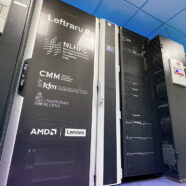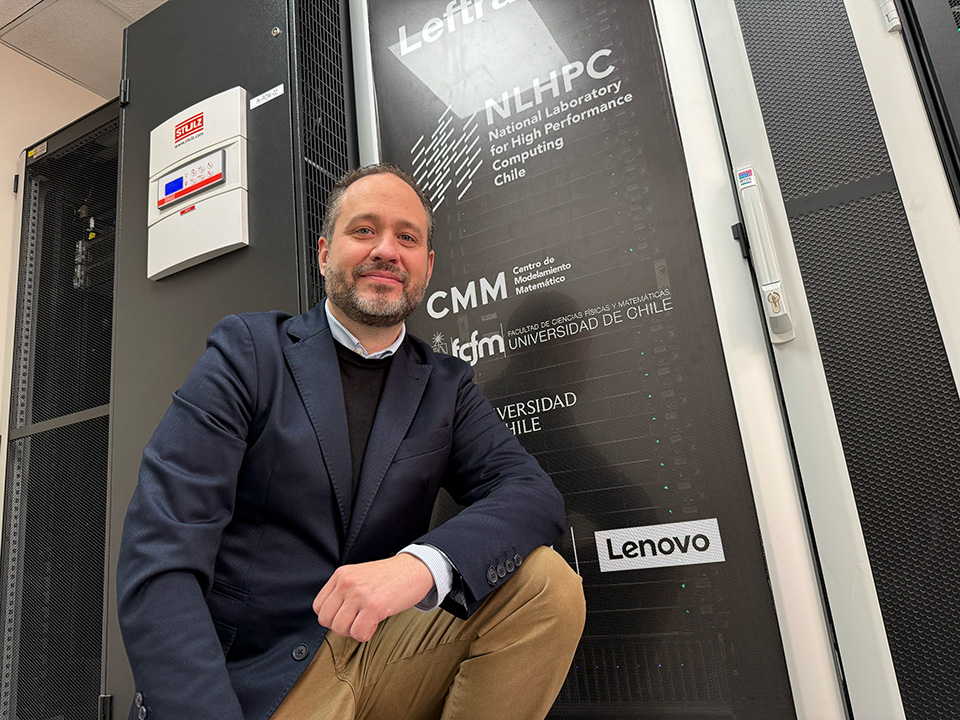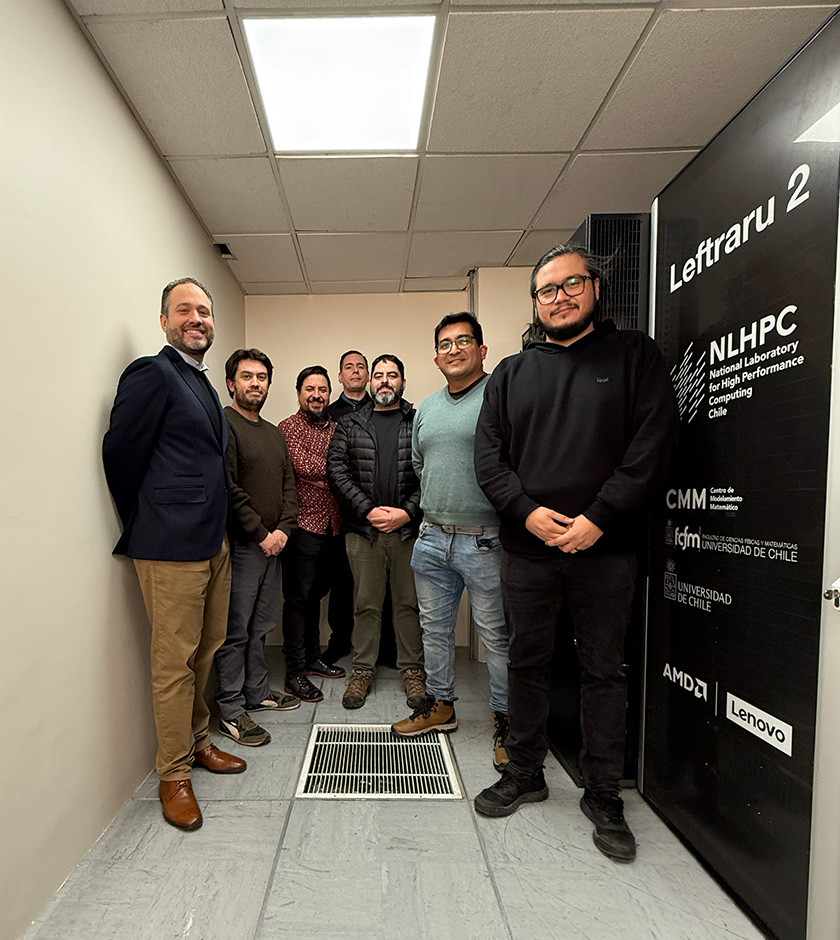
The project “Supercomputing Laboratory for Artificial Intelligence, SCAI-Lab”, which will be housed in the Faculty of Physical and Mathematical Sciences (FCFM) of the University of Chile and in which 65 institutions in the country are participating in an unprecedented way, will have an amount of US$ 7 million for the implementation in its first stage.
This June 1, during his last Public Account, President Gabriel Boric announced an investment of 14 billion pesos to strengthen advanced capacity in the processing of large volumes of data and artificial intelligence in the country -the central objective of the National Artificial Intelligence Policy-, which will seek for Chile to join the technological development based on AI. Funds were distributed through the call “Development and management of a national Supercomputing infrastructure specialized in Artificial Intelligence (AI)” made by Corfo, and in which the proposal “Supercomputing Laboratory for Artificial Intelligence SCAI-Lab” was awarded, initiative presented by the Universidad de Chile (principal), the Centro Nacional de Inteligencia Artificial (CENIA), the Centro de Modelamiento Matemático (CMM), the Pontificia Universidad Católica de Chile, REUNA, the Universidad de Concepción and the Universidad de Tarapacá.
The laboratory will create and manage a national infrastructure of cutting-edge supercomputing specialized in AI, which will seek to articulate the sum of wills and capabilities of a broad and diverse consortium of 65 national entities. The primary objective of the project will be to strengthen the Chilean technological ecosystem, boosting innovation and productivity not only in science -by enabling the country’s academic and research community to access cutting-edge AI tools and fostering the training of highly specialized talent-, but also in the modernization of the State in various critical tasks, the development of startups and the strengthening of the national industry.
“The Faculty of Physical and Mathematical Sciences (FCFM) of the University of Chile, through the National Laboratory of High Performance Computing (NLHPC), which operates within the CMM, is one of the fundamental pillars of SCAI-Lab. For the last 15 years, the NLHPC has been the main provider of supercomputing services for the national scientific community, accumulating invaluable experience in the operation of these complex infrastructures. Along with this solid base, the National Center for Artificial Intelligence (CENIA) stands as the other fundamental pillar of the project. It was natural that, for an initiative of this magnitude and with this strategic focus, the NLHPC, as a national supercomputing center, would join forces with the CENIA, as a national AI center, to lead this proposal”, says the scientific director of the NLHPC and academic of the FCFM, Jaime San Martín.

“AI and high-performance computing (HPC) have a symbiotic relationship: modern AI, with its complex models and large volumes of data, could not have emerged without the power of HPC, and in turn, AI is driving new frontiers and demands for HPC. SCAI-Lab seeks to materialize this synergy, providing the tools, which include capacity for distributed training of foundational AI models and, as a priority, for large-scale inference of these solutions, allowing Chile to actively position itself in this technological revolution”, explains Ginés Guerrero, executive director of NLHPC.
The materialization of SCAI-Lab implies a significant investment in technological and human capacities. More than half of the $7 million provided by Corfo will go to the acquisition of state-of-the-art computers optimized for extremely complex and highly specialized AI computations, which will form the core of the new infrastructure. The remainder of Corfo’s contribution will help to partially cover operating expenses, which mainly include the team of expert engineers who will be in charge of installing and maintaining this infrastructure and assisting users, as well as the cost of electricity. The full long-term operation will also be financed by the counterpart contributions of the partner institutions and the income generated by the laboratory for its services, especially to industry and startups.
“Having supercomputing infrastructure in AI is an important step for national development, since it allows us to advance in digital innovation following the accelerated pace of this technological era. For FCFM, the creation of SCAI-Lab, operating in synergy with our National High Performance Computing Laboratory, represents a new stage that consolidates and expands the leadership we have cultivated for more than a decade in this crucial area for the scientific and technological development of the country. It has been awarded to a proposal with a State vision, which brings together a large number of academic institutions and industry, with the purpose of co-developing AI technology oriented to the welfare of society and to play a relevant role in the new challenges that this technological revolution entails”, says the dean of the FCFM, Francisco Martínez.
One of the great contributions of SCAI-Lab will be to consolidate and scale the national supercomputing and AI ecosystem, articulated by a collaborative effort. “While the state-of-the-art infrastructure is fundamental, the real value lies in the ability to connect researchers, entrepreneurs, companies and the public sector, providing them with the tools and knowledge to innovate,” says the scientific director of the NLHPC, who adds that “this laboratory, by democratizing access and fostering collaboration between 65 institutions, will not only reduce the technology gap, but will also boost national sovereignty in the management of critical data and technologies, allowing Chile to develop its own solutions to our challenges and compete more strongly in the global knowledge economy”.
A decade of leadership in supercomputing
The National High Performance Computing Laboratory of the FCFM is the national supercomputing center in Chile, specializing in high performance computing and managing the most powerful supercomputer in Chile and one of the most powerful in South America.

Thus, for the new laboratory, the NLHPC will contribute its current infrastructure, which will serve as a base and complement, in addition to its technical and management expertise, and its capacity to house and operate the new equipment, which will help maximize the investment and ensure a rapid start-up of the project.
“Being at the forefront of technology is crucial for any nation that aspires to compete globally. More than a decade ago, when we at NLHPC coined the phrase ‘no compute, no compete’, perhaps not everyone grasped its scope. Today, with the explosive irruption of AI, it is abundantly clear that national investment in advanced computing capabilities is an imperative need“, says the executive director of NLHPC.
In addition to the transforming impact of this project, SCAI-Lab represents the materialization of a collaborative effort unprecedented in the technological history of Chile, uniting 65 national institutions: universities, companies, technical training centers, foundations and guilds, among others. The start-up contemplates the constitution of a new corporation that will group the associates, and then proceed to the acquisition and installation of the equipment.
“SCAI-Lab is not just a project to acquire new hardware; it is the seed for a new institutional framework, a robust platform that will allow Chile to make a qualitative leap. It is a community of knowledge, a commitment to the future and an invitation to the State to join with a strategic and long-term vision. We are deeply grateful to Corfo and the strategic impulse of the Ministry of Science, Technology, Knowledge and Innovation, for this essential initial support, which through its call ‘R&D Challenges’, grants us US$ 7 million to materialize the first stage of this vision, and we also thank each of the 65 institutions for believing in it and being part of this country effort. We are ready for the work ahead, convinced that SCAI-Lab, and the collaboration it represents, will be a transforming infrastructure for the technological development and competitiveness of Chile”, concludes Ginés Guerrero.
Institutions that are part of the project
The 65 institutions that are part of the project are listed below.
The 7 institutions that have a special role as transitory beneficiaries:
- Universidad de Chile (mandataria)
- Centro Nacional de Inteligencia Artificial (CENIA)
- Centro de Modelamiento Matemático (CMM)
- Pontificia Universidad Católica de Chile
- Red Universitaria Nacional (REUNA)
- Universidad de Concepción
- Universidad de Tarapacá
The following partner institutions make up the extensive and diverse network of collaboration that gives strength and scope to this initiative:
- Centro de Estudios Avanzados en Zonas Áridas (CEAZA)
- Centro de Investigación en Ecosistemas de la Patagonia (CIEP)
- Centro Interdisciplinario de Neurociencia de Valparaíso (CINV)
- Fundación Centro Internacional Cabo de Hornos (CHIC)
- Fundación Ciencia para la Vida (FCV)
- Fundación Instituto Profesional Duoc UC
- Inria Chile
- Instituto Profesional INACAP
- Pontificia Universidad Católica de Valparaíso
- Universidad Academia de Humanismo Cristiano
- Universidad Adolfo Ibáñez
- Universidad Alberto Hurtado
- Universidad Andrés Bello
- Universidad Arturo Prat
- Universidad Austral de Chile
- Universidad Autónoma de Chile
- Universidad Bernardo O’Higgins
- Universidad Católica de la Santísima Concepción
- Universidad Católica de Temuco
- Universidad Católica del Maule
- Universidad Católica del Norte
- Universidad de Antofagasta
- Universidad de Atacama
- Universidad de Aysén
- Universidad de La Frontera
- Universidad de La Serena
- Universidad de Las Américas
- Universidad de los Andes
- Universidad de Los Lagos
- Universidad de Magallanes
- Universidad de O’Higgins
- Universidad de Playa Ancha de Ciencias de la Educación
- Universidad de Santiago de Chile
- Universidad de Talca
- Universidad de Valparaíso
- Universidad del Alba
- Universidad del Bío-Bío
- Universidad del Desarrollo
- Universidad Diego Portales
- Universidad Finis Terrae
- Universidad Mayor
- Universidad Metropolitana de Ciencias de la Educación
- Universidad San Sebastián
- Universidad Santo Tomás
- Universidad Técnica Federico Santa María
- Universidad Tecnológica Metropolitana
- Andes Pacific Technology Access (Hub APTA)
- Asociación Gremial Colegio de Geofísicas y Geofísicos de Chile (COLGEOF)
- Cámara Chilena de Infraestructura Digital (IDICAM)
- Chiletec
- Dadneo Capital
- Empresa Nacional de Telecomunicaciones (ENTEL)
- Fintual
- Fundación Chile
- Fundación Data Observatory
- Morales, Martínez y Correa Consultores Spa (Brinca)
- JarryIP
- Unholster
By FCFM-U. de Chile Communications Subdirection
Posted on Jun 12, 2025 in News




 Noticias en español
Noticias en español
